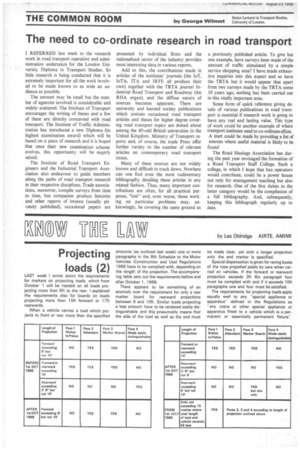The need to co-ordinate research in road transport
Page 70

If you've noticed an error in this article please click here to report it so we can fix it.
I REFERRED last week to the research work in road transport operation and administration undertaken for the London University Diploma in Transport -Studies. So little research is being conducted that it is extremely important for all the work involved to be made known to as wide an audience as possible.
The amount may be small but the num ber of agencies involved is considerable and widely.scattered. The Institute of Transport encourages the writing of theses and a few of these are directly concerned with road transport. The Institute of Traffic Administration has introduced a new Diploma (its highest examination award) which will be based on a piece of research and it is hoped that once their new examination scheme evolves, this opportunity will be eagerly seized.
The Institute of Road Transport Engineers and the Industrial Transport Association also endeavour to guide members along the paths of road transport research in their respective disciplines. Trade associa tions. moreover, compile surveys from time to time, bus companies produce histories and other reports of interest (usually pri vatcly published), occasional papers arc presented by individual firms and the nationalized sector of the industry provides most interesting data in various reports.
Add to this, the contributions made in articles of the institutes' journals (the IoT, IoTA, ITA and IRTE all produce their own) together with the TRTA journal Industrial Road Transport and Roadway (the RI-IA organ). and the diffuse nature of sources becomes apparent. There are university and learned society publications which contain occasional road transport articles and theses for higher degree covering road transport topics are dotted about among the 40-odd British universities in the United Kingdom. Ministry of Transport re ports and, of course, the trade Press offer further variety to the number of relevant articles on contemporary road transport issues.
Many of these sources are not widely known and difficult to track down. Nowhere can one find even the most rudimentary bibliography detailing these articles in any related fashion. Thus, many important contributions are often, for all practical purposes, "lost" and, even worse, those working on particular problems may. unknowingly. be covering the same ground as
a previously published article. To give but one example, have surveys been made of the amount of traffic stimulated by a simple service shopping area? I have made exhaustive inquiries into this aspect and so have the TRTA but it would appear that apart from two surveys made by the TRTA some 10 years ago, nothing has been carried out in this vitally important area.
Some form of quick reference giving details of various publications in road transport is essential if research work is going to have any real and lasting value. This type of work could be another example of where transport institutes need to co-ordinate effort. A start could be made by providing a list of sources where useful material is likely to be found The Road Haulage Association has during the past year envisaged the formation of a Road Transport Staff College. Such a college, in which I hope that bus operators would contribute, could be a power house not only for management teaching but also for research. One of the first duties in the latter category would be the compilation of a full bibliography. And, subsequently, keeping this bibliograph regularly up to date.




















































































































